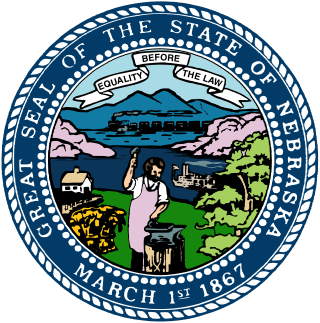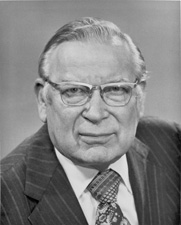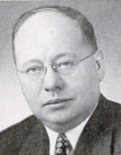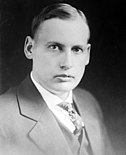
The 1958 United States Senate elections were elections for the United States Senate which occurred in the middle of President Dwight D. Eisenhower's second term. Thirty-two seats of Class 1 were contested in regular elections, the new state of Alaska held its first Senate elections for its Class 2 and 3 seats, and two special elections were held to fill vacancies.

The 1954 United States Senate elections was a midterm election in the first term of Dwight D. Eisenhower's presidency. The 32 Senate seats of Class 2 were contested in regular elections, and six special elections were held to fill vacancies. Eisenhower's Republican party lost a net of two seats to the Democratic opposition. This small change was just enough to give Democrats control of the chamber with the support of an Independent who agreed to caucus with them, he later officially joined the party in April 1955.

Debra Lynelle Fischer is an American politician and former educator serving as the senior United States senator from Nebraska, a seat she has held since 2013. A member of the Republican Party, Fischer is the third woman to represent Nebraska in the U.S. Senate and the first to be reelected.

The 1934 United States Senate election in Nebraska took place on November 6, 1934. A special election was held on the same day for the same seat. The incumbent Senator, Republican Robert B. Howell, died on March 11, 1933. William Henry Thompson, a Democratic politician, was appointed to the vacant seat. Richard C. Hunter was elected to finish Howell's term, while Burke was elected to the next term, defeating Robert G. Simmons. This was the last time until 1976 that a Democrat won a Senate election in Nebraska.

The 1976 United States Senate election in Nebraska took place on November 2, 1976. Incumbent Republican senator Roman Hruska decided to retire instead of seeking another term. Democrat Edward Zorinsky won the open seat becoming the first Democrat to win a Senate election in Nebraska since 1934.

The 1948 United States Senate election in Nebraska took place on November 2, 1948. Senate Majority Whip Kenneth S. Wherry was re-elected to a second term, defeating former Representative Terry Carpenter. He won by a larger margin than 1942, due to the absence of a third party candidate. Wherry overperformed Republican presidential candidate Thomas Dewey by 2.55%, who won the state with 54.15% in the presidential election.

The 1958 United States Senate election in Nebraska took place on November 4, 1958. The incumbent Republican Senator, Roman Hruska, was re-elected to a full term, having previously been elected in a special election. He defeated Frank B. Morrison.

The 1924 United States Senate election in Nebraska took place on November 4, 1924. The incumbent Republican, George W. Norris, was re-elected by a wide margin to a third term. He defeated John J. Thomas. Norris overperformed Calvin Coolidge, who won the state with 47.09% in the presidential election.

The 1928 United States Senate election in Nebraska took place on November 6, 1928. The incumbent Republican, Robert B. Howell, was re-elected by a wide margin to a second term. He defeated Richard Lee Metcalfe. Howell underperformed Herbert Hoover, who won the state with 63.19% in the presidential election.

The 1930 United States Senate election in Nebraska took place on November 4, 1930. The incumbent Republican, George W. Norris, was re-elected to a fourth term. He defeated Gilbert Hitchcock, the former Senator for the Class 1 seat. The anti-Norris Republican Beatrice Fenton Craig ran by petition.

The 1940 United States Senate election in Nebraska took place on November 5, 1940. Hugh A. Butler was elected for the first time, defeating Governor Robert Leroy Cochran. Edward R. Burke, the incumbent Senator, was defeated by Cochran in the primary. Butler performed on par with Wendell Willkie, who won the state with 57.2% in the presidential election.

The 1934 United States Senate special election in Nebraska took place on November 6, 1934. A regular election was held on the same day for the same seat. The incumbent Senator, Republican Robert B. Howell, died on March 11, 1933. William Henry Thompson, a Democratic politician, was appointed to the vacant seat. Richard C. Hunter was elected to finish Howell's term, defeating J. H. Kemp, while Edward R. Burke was elected to the next term.

The 1946 United States Senate election in Nebraska took place on November 5, 1946. The incumbent Senator, Hugh A. Butler, was re-elected to a second term in a landslide, defeating John E. Mekota.

The 1952 United States Senate election in Nebraska took place on November 2, 1952. The incumbent Republican Senator, Hugh A. Butler, was re-elected to a third term. He defeated Stanley D. Long. A special election to finish Kenneth S. Wherry's term was held on the same day. The independent candidate Dwight Dell also ran for the seat, despite acknowledging his slim chance of election. Butler performed on par with Dwight D. Eisenhower, who won the state with 69.15% of the vote in the presidential election.

The 1952 United States Senate special election in Nebraska took place on November 2, 1952. Kenneth S. Wherry was elected to the term in 1948. Following his death, State Senator Fred A. Seaton was appointed to the vacancy. Dwight Griswold was elected to complete Wherry's term, defeating William Ritchie. The election was held alongside a regular election. Griswold underperformed Dwight D. Eisenhower, who won the state with 69.15% of the vote in the presidential election.

Two special elections in Nebraska were held on November 2, 1954, alongside a regular election. The Class I election was to finish Hugh A. Butler's term, with Samuel W. Reynolds appointed to the vacancy on July 3, 1954. The Class II election was to finish Kenneth S. Wherry's term, with Eva Bowring as incumbent at the time of the election. Both seats were held by Republicans, with Roman Hruska winning the Class I election and Hazel Abel winning the Class II election.

The 1960 United States Senate election in Nebraska took place on November 8, 1960. The incumbent Republican Senator, Carl Curtis, was re-elected by a smaller margin than in the previous election, in 1954. He defeated Democratic candidate Robert B. Conrad. His victory underperformed Richard Nixon, the Republican presidential nominee, who won Nebraska by 24% in the presidential election.

The 1964 United States Senate election in Nebraska took place on November 3, 1964. The incumbent Republican Senator, Roman Hruska, was re-elected by a wide margin over Raymond W. Arndt, winning every county save for Saline County. His victory vastly overperformed Barry Goldwater, the Republican presidential nominee, who lost the state by 5% in the concurrent presidential election. This was the only race in the 1964 United States Senate elections in which the Republicans won by double digits.

The 1966 United States Senate election in Nebraska took place on November 8, 1966. The incumbent Republican Senator, Carl Curtis, was re-elected by a wide margin over Governor of Nebraska Frank B. Morrison.

The 1970 United States Senate election in Nebraska took place on November 3, 1970. The incumbent Republican Senator, Roman Hruska, was re-elected, albeit with a reduced majority. He defeated the former Governor of Nebraska Frank B. Morrison. This race was a rematch of the 1958 race; when Hruska defeated Morrison to win his first full term in the Senate.










